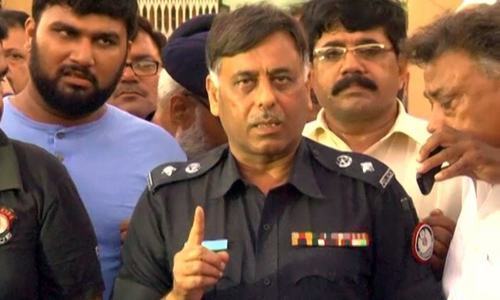Former SSP Malir Rao Anwar was produced in an Anti-Terrorism Court (ATC) on Thursday for the hearing of a case regarding the extrajudicial killing of Naqeebullah Mehsud.
More than 20 police mobiles and two armoured personnel carriers escorted the former SSP.
The ATC granted police a 30-day physical remand of the former SSP during the hearing that was held in-camera.
Anwar's counsel, Advocate Javed Ahmed Chhatari, while speaking to reporters said the investigating officer had requested the court for a 30-day remand, saying there were some security concerns.
When asked by the judge if he had any objections, Anwar said he realised remand was a requisite for the investigation, the lawyer said.
Earlier today, the ATC judge had ordered the police to produce former SSP Malir Rao Anwar before the court. Investigation officials told the court that Anwar would be produced before an administrative judge, after which he would appear before the ATC.
ATC Judge Khalida Yaseen, however, dismissed this argument and ordered police to produce Anwar during the ongoing hearing. Ten other police officials who had been arrested earlier also appeared in court today.
Anwar, who is the chief suspect in the case was arrested a day earlier on the orders of the Supreme Court.

Police had filed a charge sheet against 25 officials including Anwar before an ATC judge earlier this month. With the former SSP's arrest, the total number of officials that are in police custody has gone up to 11 while 14 police officials are still absconding.
After eluding law enforcement agencies for over a month, Anwar finally appeared before the SC on Wednesday.
Also read: Dawn Investigation: Rao Anwar and the killing fields of Karachi
“This is the majesty of court before which he [Rao Anwar] has submitted,” a visibly relieved Chief Justice of Pakistan Mian Saqib Nisar had observed. The CJP had earlier issued repeated orders to the Sindh police chief for the fugitive officer’s arrest in the suo motu case pertaining to the killing.
The Supreme Court had rejected his request for protective bail with an observation that a fugitive from justice neither commanded any sympathy nor was he a favourite child of the law.
The court also appointed a Joint Investigation Team (JIT) comprising officials of the Sindh police to grill the officer after rejecting his request for including representatives of Inter-Services Intelligence (ISI), Military Intelligence (MI) and Intelligence Bureau (IB) instead of police officers from Sindh.
However, the court had dropped contempt of court proceedings initiated against him for defying its order to appear before it and lifted the direction for freezing his bank accounts and blocking of his computerised national identity card.
His name will remain on the Exit Control List (ECL) as per the order of the Supreme Court on Jan 23 when he had made a botched attempt to flee the country. Since then the whereabouts of the former police officer had been unknown.
Observers were of the opinion that his ‘mysterious appearance’ was the result of intense back-channel efforts and in-camera briefings during the past few days that helped in identification of those who facilitated his attempt to leave for Dubai from the Islamabad airport on Jan 23.
Staged encounter
Naqeebullah Mehsud — whose name was given as Naseemullah on his national identity card — was a shop owner fond of modelling, relatives of the deceased had told Dawn.
Hailing from South Waziristan, he was among four suspects killed in an 'encounter' with a police team headed by Anwar in the Usman Khaskheli Goth on the outskirts of the metropolis in January 2018.
Anwar had alleged that Naqeebullah was a Tehreek-i-Taliban Pakistan (TTP) militant, but a later statement reportedly issued by a spokesperson for TTP's South Waziristan chapter had termed the claim "baseless", clarifying that the deceased had no links with the banned militant outfit.
Naqeebullah's family had also disputed Anwar's claim, saying that the 27-year-old had no links with any militant organisation.
In January, an inquiry team of senior police officers probing the alleged extrajudicial killing of Mehsud had found that the Waziristan native was killed in a fake encounter which was staged by then-SSP Malir Anwar on January 13.
The high-level inquiry committee had also concluded in its initial report submitted to the Sindh police that the deceased man had no militant tendencies.
Correction: An earlier version of this story incorrectly stated that former SSP Rao Anwar will appear in the Sindh High Court on Thursday. The error is regretted.















































